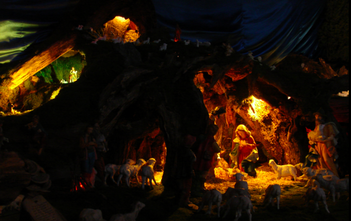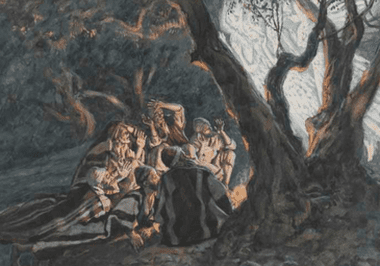Think more deeply about Christmas: The bible’s Christmas story begins and ends with death12/18/2017  On the one hand, we harness Christmas "in" the church as a platform to attract people to our church. On the other hand, the retail world harnesses the "spirit" of Christmas so people will buy stuff. Not so sure there is a shade of difference between these two idolatries. I am convinced, however, that our tamed version of the Christmas story is truly unable to save to the uttermost, to deliver men and women from the deep despair, selfishness, suffering, and sordid wounds that scar our souls and minds. As my daughter once reminded me, after a long ago now forgotten Christmas Eve service, we cannot avoid the fact that the Christmas story begins and ends in a death sentence—at every turn someone wants Jesus dead. Yet, we have so tamed the original (Matthew and Luke) story and have made it more palatable to fit on a Hallmark card or as background muzak for our Christmas season shopping experience at all the big box stores stores. There is lament blended with the angelic choir declaring peace and joy; and, it is only through this lament (found in Mary’s song and in Rachel’s cry) that this joy and peace may come. Or, found in that all too easily passed over lamentful promise to Mary by Simeon, the old man in the temple after Jesus’ circumcision, who said,
The wretchedness of humanity and the deep wounds of our neighbors are not cured by our tamed, commercialized Christmas story.
Think more deeply about Christmas.
0 Comments
 The original Christmas story reads more like the Game of Thrones than it does our seasonal Hallmark cards, church pagents, and sentimental retail versions. Indeed, Christmas is not a children's story. Sometimes English translations of the Bible can mask the bluntness of the original. Our contemporary Bible versions seem to tame many of its stories for the modern reader. But, not here in Luke’s Christmas morning story of the shepherds. This time, the narrative is very blunt. It is, then, left to December preachers to tame the story for Christmas messages that are G-rating and family safe. Almost every version, however, even the paraphrases, leave this text as it should—raw, straightforward, and blunt. And, we need to hear it this way. In Luke 2, these shepherds were afraid, frightened, and as the Greek indicates, “They feared a great fear.” I do not imagine a bunch of skinny, youngsters, mulling around the hillsides, holding quaint staffs, warming their hands over an open fire, and patting lambs on their heads. These were shepherds, men ready to fight off wolves, lions, and bears. The text doesn’t say they were startled or caught by surprise or even awed. They saw the Angel of the Lord, and their response: these men “feared a great fear.” As the translation here records, “they were terribly frightened.” I don’t know about you, but I would have been afraid to say the least, and I am hardly a burly shepherd. Problem is, we know the Christmas story all too well. Our version is tame, cute, winsome, merry, fit for a Christmas pageant at a church building. I call our churchy versions the Hallmark Card story of Christmas. It was going to take a lot to alleviate these shepherds’ state of being terribly afraid. Our sentimental versions would not have done the trick. The Angel knew: They needed a sign. Something big. Something bigger than the fear itself.
You have to be kidding! A baby? This is a twist I didn't see coming. There is a puzzle to the real Christmas story, a riddle, mystery, even some perplexity. The contrast is staggering. The brawny Shepherds fear was to be relieved by a baby lying in a cow trough in some barn, a cattle shed, out back of an inn in Bethlehem. Now that’s amazing. That’s how the original Christmas story is introduced. No tinsel or cute cherubs. No warm living room with presents under a decorated tree. No wonderful Christmas concert or pageant. We’ve come a long way in presenting the Christmas story, in taming it and relieving it of its mystery (its puzzle and irony, its realness). This is not a good thing. “But the angel said to them, ‘Do not be afraid; for behold, I bring you good news of great joy which will be for all the people; for today in the city of David there has been born for you a Savior, who is Christ the Lord. This will be a sign for you: you will find a baby wrapped in cloths and lying in a manger.’ And suddenly there appeared with the angel a multitude of the heavenly host praising God and saying, Along with being way too familiar with the Christmas story, we are also too accustomed to the Christmas story as we celebrate it—that is, our own seasonal church and family habits. We now, without much thought, juxtapose the revealed story with the commercialism, tinsel, and lights of a holiday season made for our economy rather than our souls. Although America still boasts of a vast population of Christian believers and church-goers, society as a whole would prefer that we keep our “religion” and Jesus out of public life—out of school boards, out of government, out of the bedroom, etc. But, not out of the major retail season for the season. Even when the corporate-world seeks to take the word “Christmas” out of their stores, they still want to keep the “spirit,” the Christmas-grin from the invisible Christmas-Cheshire cat, to keep the retail flying off the shelves and showroom floors. They want just enough “belief” to treasure the concepts and images of a virgin birth, angelic choirs, and that baby in swaddling clothes in a manger to make sure people are inspired to buy, buy, buy. In an article entitled, “The History of Christmas,” G. K. Chesterton describes how it is that modern man has exchanged the wonder of the Christmas story for commercialism: “Moving step by step, in the majestic march of Progress, we have first vulgarised Christmas and then denounced it as vulgar. Christmas has become too commercial; so many of these thinkers would destroy the Christmas that has been spoiled and preserve the commercialism that has spoiled it.” We are in danger of exchanging the wonder of the Luke 2 Christmas story for lesser wonder of commercialism and a more pleasant, joyous path to church growth and fuller body count in our sanctuaries during the season. A story that saves retail, perhaps. Yet, we need a Christmas story, un-tamed, a story that frightens us—and a story where the only thing that alleviates our fear is that baby, the Lord of heaven and earth, come in a smelly, common cattle shed out back. Only the untamed Christmas story found in the Gospel narratives is able to relieve our fears and save our troubled souls.
|
AuthorChip M. Anderson, advocate for biblical social action; pastor of an urban church plant in the Hill neighborhood of New Haven, CT; husband, father, author, former Greek & NT professor; and, 19 years involved with social action. Archives
February 2024
Categories
All
|
Pages |
More Pages |
|
 RSS Feed
RSS Feed